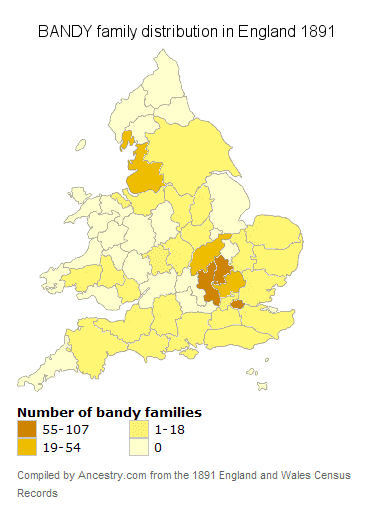|
the Bandy name |
| There appears to be little certainty about the origin of the name BANDY. One thing is certain however, and that is that there are a number of theories. Here are some of them, please let us know if you have another to add, or wish to give more evidence in support of one of the existing theories: |
|
English Speaking world origin - simple surname adoption Nearly every Bandy in the English speaking world will understand the relevance of "bandy-legs" to themselves, probably as a child. However Bandy was regularly used as a nickname for people who actually had bandy legs whatever their original name. It is often seen as an alias in the criminal records in England and in the description or name of slaves in American records. So it follows that the name may have simply been adopted by some in preference to their originl names since it appears that most english speaking countries had no laws preventing the adoption of a different surname, only legal mechanisms to formalise that adoption. England still continues with that freedom. English Origin - a peasant farmer (a rare and unusual variant of BOND) This is a quote from an, as yet, unidentified reference book: "Bond English: status name for a peasant farmer or husbandman, Lars Bonnesen (http://bonne.port5.com) was kind enough to email us from Denmark to say: Just for your information, Bondesen and Bonnesen do not have anything to do with each other. It is correct, that the Danish word bonde means "peasant", but the surname Bonnesen relates to Dutch immigration to Denmark from a region called something like "Bonness". Some supporting evidence for the above (and following) theories: Interesting theory Cheri, but I wouldn't be able to verify it I'm afraid. It is though quite possible and the name is known in Norway from as far back as the 13th century. The Bonde family in Norway were wealthy and known to have had good and powerful connections to the Royal family, of whom many believe they derived. This is however not possible to verify today. The name derive of Old Norse "buandi madr" and simply means farmer today, but we believe the meaning of the surname must have had a greater and more powerful meaning somehow. Derek Bandy adds: - this has been my theory all along - that the name came to England during the Scandinavian invasions. The Norwegian royal connection fits well (however tenuous) because of the important social/political role that Bondi the Constable held in 1086. After all the Danelaw had controlled eastern England up to a short time before that - and we know that the "Danes" were actually from all over Scandinavia and many of them had close relations with the Normans (who were, of course, Scandinavians who had settled in Normandy in the 9th & 10th Centuries). It is equally possible that the name came to England via (Scandinavian) Normandy. If some name holders remained in Normandy and then moved within (what is now) France it would also explain the existence of French variants later. The French Normans certainly battled all over Europe. However, we have to admit that there are probably many similarly named but unconnected lines because nearly everybody was a farmer. In which case why aren't there more Bandys? Scandinavian Origin - a peasant land holder with voting rights From a Scandinavian word buandie which denoted the lowest level of the land owning (or holding) peasant class, with some form of voting rights. The Scandinavian invasions of England took place in the ninth and tenth centuries. They settled all along the east coast and for a while had a separate Danish Kingdom and law, called the Danelaw. However, small numbers of scandinavians had also settled along with germanic tribesmen in the same areas since the fifth centuries and possibly earlier during the Roman period. The area of England which (as far as we can tell) had the highest density of Bandys in the sixteenth century and which also appears to have the highest density of Bandys today is in the south western corner of the Danelaw to the north of London; the modern English counties of Buckinghamshire and Bedfordshire. The expansion Northward and especially into Lancashire can be explained by well documented Mill recruiting drives which took place in the mid 19th century. |

French Origin - the Clothier
Occupational origin: derived from the French word bande, first documented in the 12th century, itself deriving from the Frankish word binda meaning "band or strip". The initial bearer of the name may therefore have been in the trade of making or selling strips of cloth.
French Origin - the Soldier
An alternative meaning of the word bande: "band, troop or company" may have been the origin giving rise to a family name meaning the descendant of the soldier.
The earliest French record of the Surname was GILBERT BANDY (date not stated) Count of Naleche, a member of the 23rd Dragoon Regiment. His arms were: Azure a chevron argent between three mullets of six points or, two in chief and one in base.
French Origin - the Flag Carrier
Of French origin meaning "one who carries the flag" (no further explanation given)
Dutch Origin - "Van Dyke"
Some people have the opinion that the Bandys were Dutch. They say the original spelling may have been VanDyke, then altered to Bandyke, and finally to Bandy. Some others say the name was Banning.
Baindey
Banday
Bandee
Bandey
Bandi (Switzerland and Germany - is this family related ? anyone?)
Bandie
Banduy
Bandy
Bandye
Bandys
Banta IS NOT A NAME VARIANT (or is it?)
Baudey & Baudy are mistranscriptions of handwriting
Bondey
Bondy
Boundy
Bundey
Bundie
Bundy